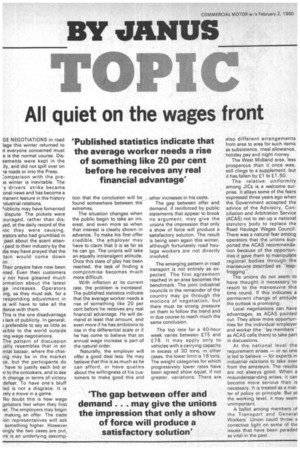BY JANUS
Page 82

If you've noticed an error in this article please click here to report it so we can fix it.
All quiet on the wages front
'Published statistics indicate that the average worker needs a rise of something like 20 per cent before he receives any real financial advantage'
GE NEGOTIATIONS in road lage this winter returned to it everyone concerned must e is the normal course. Diseements were kept in the ily, and did not spill over on le roads or into the Press. 2omparison with the preis winter is inevitable. The 'y drivers' strike became onal news and has become a -nanent feature in the history nclustrial relations.
3ublicity may have fomented dispute. The pickets were :ouraged, rather than disyed, at the daily record of the roc they were causing. arators who had grumbled in past about the scant attenpaid to their industry by the dia may have prayed that the lain would come down
Their prayers have now been nted. Even their customers y not have gleaned much Drmation about the latest ge increases. Operators ing, as they nnust ask, for a responding adjustment in as will have to take all the dence with them.
This is the one disadvantage lack of publicity. In general, ; preferable to say as little as isible to the world outside -ing wage negotiations.
The pattern of discussion Jelly resembles that in an ?mat bazaar, where the chating may be in the market ce, but the participants do have to justify each bid or to the onlookers, and to see :h change in terms of victory defeat. To have one's bluff led is not a disgrace. It is rely a move in a game.
No doubt this is how wage gotiators feel when they first The employers may begin making an offer. The trade ion representatives will ask something higher. However ongly the two cases are put, :re is an underlying assump tion that the conclusion will be _ found somewhere between the extremes.
The situation changes when the public begin to take an interest, and even more so when that interest is clearly shown in advance. To make his first offer credible, the employer may have to claim that it is as far as he can go. The unions will take an equally intransigent attitude. Once this state of play has been reached, the task of finding a compromise becomes much more difficult.
With inflation at its current rate, the problem is increased. The published statistics indicate that the average worker needs a rise of something like 20 per cent before he receives any real financial advantage. He will demand at least that amount, and even more if he has ambitions to rise in the differential scale or if he has come to believe that an annual wage increase is part of the natural order.
Naturally, the employer will offer a good deal less. He may believe that this is as much as he can afford, or have qualms about the willingness of his customers to make good this and ..other increases in his costs.
The gap between offer and demand, if reinforced by public statements that appear to brook no argument, may give the unions the impression that only a show of force will produce a satisfactory solution. The result is being seen again this winter, although fortunately road haulage workers are not directly involved.
The emerging pattern in road transport is not entirely as expected. The first agreement reached in an area becomes the benchmark. The joint industrial councils in the remainder of the country may go through the motions of negotiation, but there must be strong pressure on them to follow the trend and in due course to reach much the same conclusion.
The top rate for a 40-hour week varies between £75 and £78. It may apply only to vehicles with a carrying capacity in excess of 30 tons; in other cases, the lower limit is 18 tons. The weight categories for which progressively lower rates have been agreed show equal, if not greater, variations. There are also different arrangements from area to area for such items as subsistence, meal allowance, holiday pay and night money.
The West Midland area, less prosperous than it once was, still clings to a supplement, but it has fallen by El to £1.50.
The relative uniformity among JICs is a welcome surprise. It allays some of the fears expressed three years ago when the Government accepted the advice of the Advisory, Conciliation and Arbitration Service .(ACAS) not to set up a national statutory body to replace the Road Haulage Wages Council. There was a natural fear among operators that the unions supported the ACAS recommendation because of the opportunities it gave them to manipulate regional bodies through the .manoeuvre described as "leapfrogging' The unions do not seem to have thought it necessary to resort to the manoeuvre this time round. If this indicates a permanent change of attitude the outlook is promising.
Local negotiations can have advantages, as ACAS pointed out. They allow more opportunities for the individual employer and worker (the "lay members" as ACAS calls them) to take part in discussions.
At the national level the requirement arises — or so one is led to believe — for experts in industrial relations to take over from the amateurs. The results are not always good. When a misunderstanding arises, it can become more serious than is necessary. It is treated as a matter of policy or principle. But at the working level, it may seem U nimportant.
A ballot, among members of the Transport and General Workers' Union could throw a corrective light on some of the issues that have been paraded as vital in the past.








































































































































